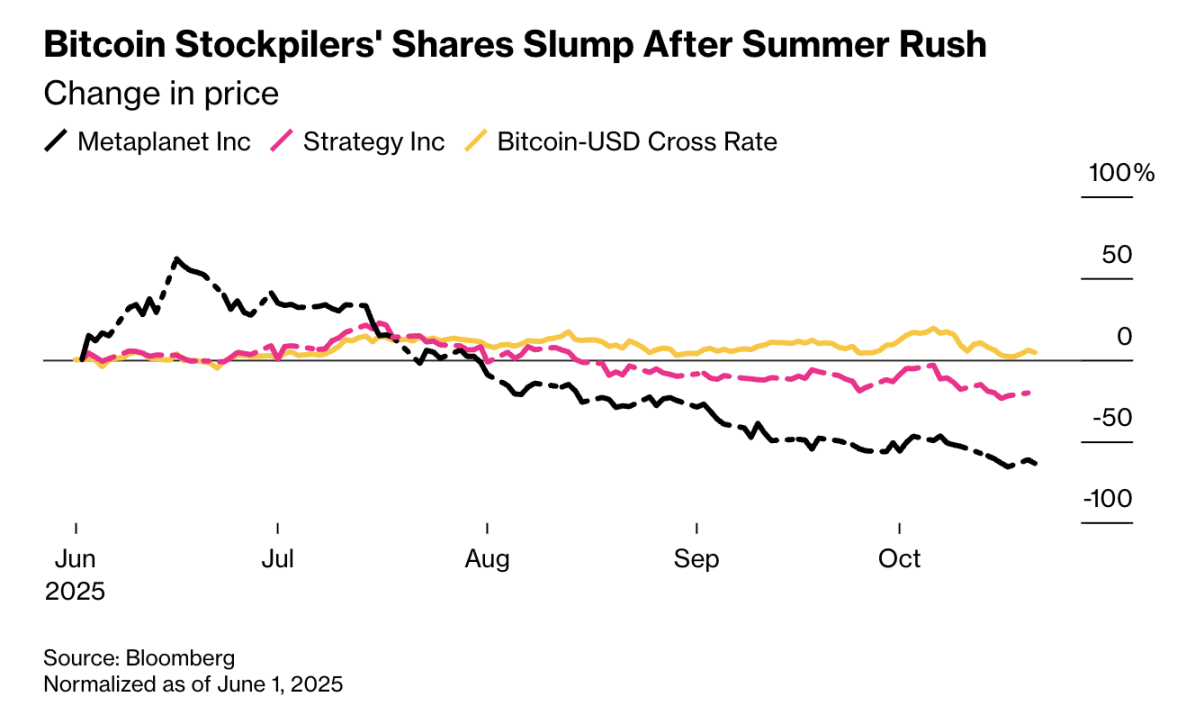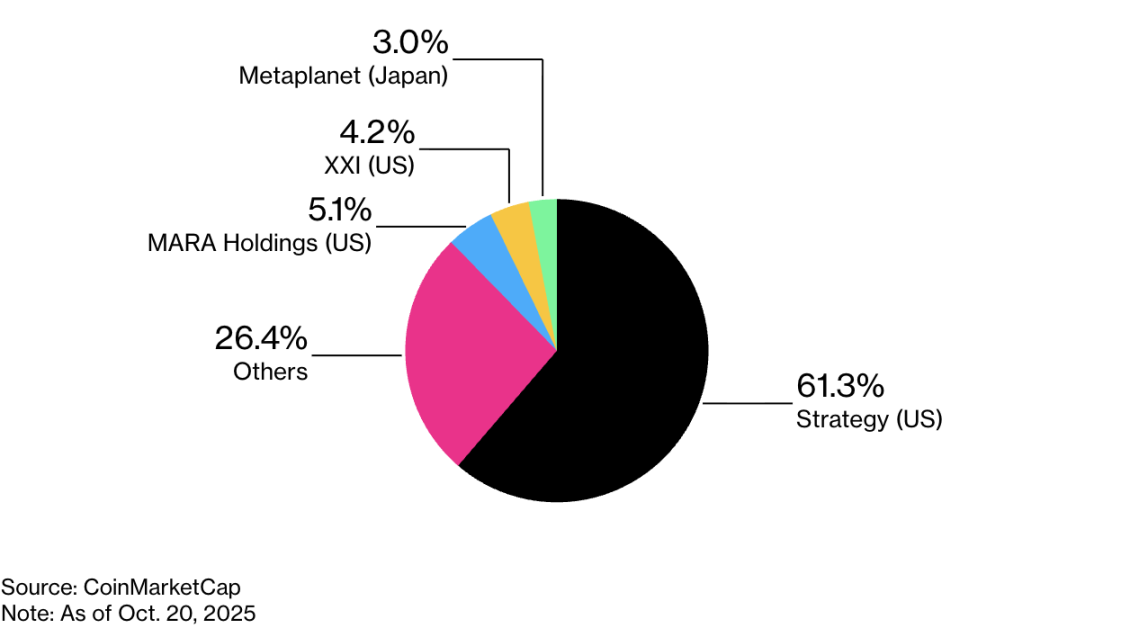Three major Asian exchanges boycott cryptocurrency treasury companies
- 核心观点:亚太主要交易所抵制加密货币财库公司。
- 关键要素:
- 香港质疑五家DAT转型,禁持大额现金。
- 印度澳洲交易所拒绝类似加密货币囤积计划。
- 日本虽宽松,但MSCI拟将DAT剔除指数。
- 市场影响:抑制加密资产囤积,冲击相关公司估值。
- 时效性标注:中期影响
Original Article by Alice French, Richard Henderson, Kiuyan Wong, and Yasutaka Tamura
Original translation: Joe Zhou, Foresight News
- Hong Kong Exchanges and Clearing Limited (HKEX) has questioned at least five companies planning to transform into DATs (digital asset treasury companies), saying current regulations prohibit firms from hoarding excessive liquidity.
- Resistance to DATs has also emerged in India and Australia, where local exchange operators have similar concerns, potentially stalling the plans of many cryptocurrency treasury companies.
- In the Asia-Pacific region, Japan is a special case. Local listing rules are relatively relaxed for digital asset treasury companies, giving them considerable latitude. Even there, however, signs of friction are beginning to emerge—for example, MSCI has proposed removing large cryptocurrency treasury companies from its global indexes.
The three major stock exchanges in the Asia-Pacific region are boycotting companies that masquerade as listed companies but whose primary business is to hoard cryptocurrencies.
According to people familiar with the matter, Hong Kong Exchanges and Clearing Limited (HKEX) has questioned at least five companies planning to shift their core businesses to digital asset treasury strategies in recent months, citing regulations prohibiting the holding of large amounts of liquid assets. To date, none of these companies have received approval. So-called digital asset treasury companies (DATs) have faced similar resistance in India and Australia.
This boycott targets both cryptocurrencies themselves and listed companies that focus on hoarding crypto assets, posing risks to the digital asset market that continues to rise throughout most of 2025.
Bitcoin hit a record high of $126,251 on October 6th, marking an 18% gain this year. This surge is largely driven by the emergence of a large number of companies dedicated to hoarding Bitcoin. The model pioneered by MicroStrategy, the $70 billion Bitcoin giant led by Michael Saylor, has spawned hundreds of imitators worldwide. Many of these companies have market capitalizations exceeding their total crypto holdings, highlighting the strong investor demand.
Buying into digital asset treasury companies (DATs) has slowed recently, and their share prices have declined, coinciding with a sharp sell-off across the crypto market. A recent report from Singapore-based 10X Research estimates that retail investors have lost approximately $17 billion in DAT trading.

In the Asia-Pacific market, concerns among exchange operators could completely hinder the plans of cryptocurrency hoarders.
"Listing regulations directly determine the speed and degree of standardization of the cryptocurrency treasury model," said Rick Maeda, a crypto analyst at Tokyo-based Presto Research. He added that "predictable and relaxed" regulations can attract capital and boost investor confidence, while a stricter environment can slow down the implementation of digital asset treasury companies.
"Cash Companies" among Listed Companies
Under Hong Kong Stock Exchange rules, if a listed company's assets consist primarily of cash or short-term investments, it will be considered a "cash company" and its shares may be suspended from trading. This is intended to prevent shell companies from using their listing status as equivalent to money for trading.
Simon Hawkins, a partner at law firm Latham & Watkins, said that for companies intending to hoard cryptocurrencies, approval depends on whether they can "demonstrate that acquiring crypto assets is a core component of their business operations."
People familiar with the matter said that it is currently prohibited for listed companies in the former British colony to transform into pure cryptocurrency hoarding companies.
A spokesman for the Hong Kong Stock Exchange (HKEX) declined to comment on the specific companies it questioned but said its framework "ensures that the businesses and operations of all applicants for listing and existing listed companies are viable, sustainable and have substance."
In a similar case, the Bombay Stock Exchange last month rejected Jetking Infotrain's application for a preferential allotment of shares. The company had said it would invest part of the proceeds in cryptocurrencies. A filing indicates the company is appealing the decision. The BSE and Jetking did not respond to requests for comment.
In Australia, the Australian Securities Exchange (ASX) Ltd. prohibits listed companies from holding 50% or more of their balance sheets in cash or cash-like assets. Steve Orenstein, CEO of software company Locate Technologies Ltd., said this provision makes adopting a cryptocurrency treasury model "almost impossible." According to a spokesperson, the software company-turned-Bitcoin buyer is in the process of relocating its listing from Australia to New Zealand, where the New Zealand Exchange (NZX Ltd.) is open to digital asset treasury companies (DATs).
A spokesperson for the Australian Stock Exchange (ASX) said listed companies turning to investing in Bitcoin or Ethereum are “advised to consider structuring their investment products as exchange-traded funds (ETFs).” Otherwise, they “are unlikely to be considered suitable for listing on the official list.”
They said the Australian Stock Exchange (ASX) did not prohibit cryptocurrency treasury strategies, but warned that potential conflicts with listing rules must be managed carefully.
Japan's "hoarders"
Japan is a notable exception in the Asia-Pacific region, where it is common for listed companies to hold large amounts of cash, and listing rules are relatively relaxed for digital asset treasury companies (DATs), giving them greater freedom.
“Once a company goes public, if it makes proper disclosures — such as disclosing that it is buying Bitcoin — it would be quite difficult to immediately declare those actions unacceptable,” Hiromi Yamaji, CEO of Japan Exchange Group, said in a press release on September 26.
According to BitcoinTreasuries.net, Japan has 14 publicly listed Bitcoin buyers, the most in Asia. Among them is Metaplanet Inc., a hospitality company that was an early adopter of the digital asset treasury model and currently holds approximately $3.3 billion in Bitcoin. Since the company began its transition in early 2024, its stock price soared to a peak of 1,930 yen in mid-June, but has since fallen by over 70%.

Japan has also seen some of the more bizarre bitcoin purchases: Convano Inc., a Tokyo-based, stock-listed nail salon operator, announced in August plans to raise about 434 billion yen ($3 billion) to buy 21,000 bitcoins. At the time, the company’s market capitalization was a fraction of that amount.
Even for Japanese cryptocurrency hoarders, signs of friction are emerging. MSCI, one of the world's largest index providers, recently proposed excluding large digital asset treasury companies (DATs) from its global indexes following an investigation into Metaplanet's $1.4 billion international equity offering in September. Metaplanet joined the MSCI Japan Small Cap Index in February and said it would use most of the proceeds to purchase Bitcoin. It has since purchased an additional 10,687 tokens. Metaplanet did not respond to a request for comment.
MSCI said in a statement that digital asset treasury companies (DATs) “may exhibit characteristics similar to investment funds” and therefore are ineligible for inclusion in its indices. MSCI recommends a ban on companies that hold 50% or more of their assets in crypto assets.
If excluded from the index, Digital Asset Treasury (DAT) would no longer enjoy passive inflows from funds tracking the index, Japanese equity analyst Travis Lundy wrote in a report for Smartkarma. He added: “This could destroy the argument for its price-to-book premium.”



